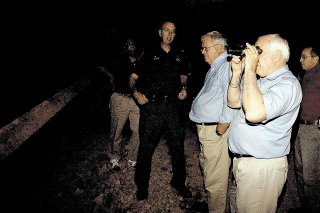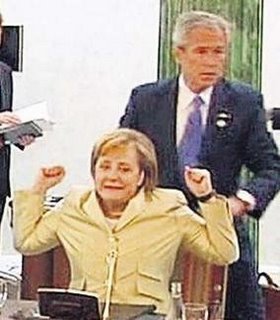I just got home from the
Border Action Network's Fundraising/Campaign Update event. I took four pages of notes and will try to decipher the thoughts expressed with this post. Let me begin by saying that I'm glad to be plugged into a group of people that share my values and are willing to address the hard questions that affect our region/nation.
Tonight's event was held at the Southside Presbyterian Church in the heart of Tucson, it was an outdoor event with roughly 100 participants and featured a catered meal of chilaquillas, frijoles y arroz. There was also music provided by Francisco Robles and a comapañero whose name I missed. They played ranchera music and some activist songs that comprise the heart, the corazón, of events like this. There were translation services provided to the monolingual participants since the presentations were given in both Spanish and English.
The evening began with the meal followed by an address by Jennifer Allen, Executive Director of the Border Action Network of Southern Arizona. She explained that their work's foundation is to insist that the voices of people that are most affected by border policy have a voice in the discussion. We are the ones who live with the consequences of the actions of local, state and national policy, which is why the work is so important. Futhermore, they are organizing to increase the capacity of outreach and mobilization of the people. She cited three specific objectives: skills, space and support.
The keynote for the event was then introduced. Fernando Garcia, Director of the
Border Network for Human Rights, addressed the group on the work being done in their region spanning the border regions of Texas and New Mexico. His outline followed three main topics:
- the situation along la frontera
- the situation nationally, specifically within the political realm
- the role of BNHR and immigrants in the community
La FronteraSr. Garcia describes the situation as a dramatic crisis - a human rights crisis - that has seen thousands of immigrant deaths in the desert - almost 4000 in the past ten years alone. He made mention that these are our tios y primos, nuestra familia who are dying in search of a better life. There are also countless human rights violations occuring - beatings, illegal detentions, and racial harrasment due to a situation that has gotten out of hand. There is now a growing war along the border with the deployment of National Guard troops along the line in addition to the militarized agency already in place - Border Patrol. Things are getting worse, and Fernando asked the rhetorical question: What can we do to change the reality in our communities?
National PolicyThings have escalated recently, first with the passage of
House Resolution 4437 [.pdf link] and continuing with the human rights marches across the country by the immigrant community and their supporters. The bill basically said that the current policies in place were acceptable but also took further steps to militarize the border by changing the rules that govern local police forces - allowing them to make arrests based on immigration status - something historically reserved for federal law enforcement agencies. HR4437 also calls for the construction of more walls along the border, triple-layered walls being the preferred example. Finally, it would criminalize undocumented immigrants, making it a felony to be here with an invalid immigration status. Going further, it criminalizes the actions of anyone deemed a direct supporter of illegal immigrants. Fernando quipped that if the resolution had been passed in an identical form in the Senate yesterday and signed by George Bush, that our gathering tonight would've been filled with felons.
The national debate has characterized undocumented immigrants as lazy, non-contributors to society, drug dealers, etc. - an unacceptable and demeaning labeling of a population that indeed contributes a lot to the United States. The solutions are to either deport everybody, which is unacceptable, or recognize their hard work and accept them into a society that they are an integral part.
Fernando does not believe that legislation will get passed in Congress anytime soon. The majority party is supportive of the anti-immigrant community and it is probably a good thing that they are refusing to move (barring an international incident).
Roles of immigrants and BNHRThere is a fundamental understanding that immigrants deserve a bigger role in the discussion currently raging in this country. They are providing a movement to give immigrants the ability to empower themselves and organize. The framework of the past saw most outreach to the immigrant community through legal channels, providing assistance in the legal process. Many times they were viewed as victims,
pobrecitos. This was not a positive way to interact with a community that we care about because it didn't give them the ability to change their own reality. In order to do this we need to organize, educate and build the infrastructure for a movement.
The BNHR began training Human Rights Promoters (Promotores de Derechos Humanos) to begin the discussion that would define the reality they face and to build a movement with the immigrants at the heart of the operation. So far, the BNHR has trained over 200 Promotores, these have become the leaders of the work being done in their own communities.
The Promotores undergo training in these specific areas:
They are leading the distribution efforts of information to other immigrants regarding their fundamental rights as human beings. As more Promotores are trained, they are forming Human Rights Community-Based Committees in their neighborhoods. People are gathering in homes to come together to address the issues specific to their area and solutions to fix them.
Fernando mentioned that this is different than the Civil Rights Movement of the 1960s because it will be all-encompassing of Human Rights - health care, education, workers' rights, which move beyond the legalization/citizenship realm that often characterizes the work that BNHR and other groups engage. They are working to build a better society for everyone.
The primary goal is to provide a path to integration within a society that is not racist but based on human rights - to live in dignity with equality. They are building this movement from scratch, using methodologies they have created on their own. He closed with a call to the community for moral and financial support and thanked everyone for attending.
At that point, Jennifer Allen of the Border Action Network (BAN) returned to the mic and gave a short history of their work in Southern Arizona. BAN started in 1999 as an all-volunteer group and in 2001 hired its first staff members. They have focused their work in the Nogales and Douglas areas by knocking on doors and simply talking to people about their reality.
BAN members found that many people felt isolated, targetted and there was alot of fear. The conversations they began allowed the people to step out of their fear so that they could transform their communities through grassroots work. The focus began with local policies but have recently expanded to the national level as immigration issues returned to the debate in D.C.
The goal is to make the policies in our communities stronger and more responsive to the needs of the people. There are approximately 350 families active now in the Border Action Network and they are growing wildly in the current climate. The discussions engaged have been about fundamental values, education on the rights of the people and ways to defend them but also to brainstorm of new rights that would fit within a society based on Human Rights.
Following the model of the BNHR, the Border Action Network of Southern Arizona has trained the first class of Human Rights Promotores. Seven of them were introduced and given time to speak from their hearts on what they've learned and where they feel the work needs to continue. Their graduation will be held on Saturday, August 5th. After the completion of the program, they will be given three month workplans for their specific communities that will help to promote all rights - civil, constitutional and of course basic human rights.
The evening ended with a call for financial support (it
was a fundraiser) and they were able to exceed their goal of $500 for the evening. I spoke to one of their organizers after the event and asked him how their summer fundraising campaign is going. They are almost at their goal of $75,000 but still have a ways to go. If you are able, please consider supporting the work of these human rights advocates. They are doing society a great service by empowering people who are in our midst. As a proud liberal, it was a jolt of energy to hear speakers and like-minded activists speak about fundamental needs in a global society. You can donate via their secure website
at this link.
To close, I scribbled these words down on my notepad before the event began. There's not much of a rhythm but pretty much depict what's in my heart tonight.
The lines you draw to divide humanity
will never divide the human soul.
Dignidad, justicia y equalidad are what we seek.
Build your walls, send your troops
our people's spirits will not see defeat.
¡Sí, Se Puede!
Crossposted at BooMan Tribune and My Left Wing (probably others later)





